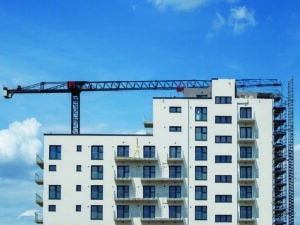
City figures show the Boston Planning & Development Agency is on track to permit the smallest number of new housing units this year since at least 2016 – or even earlier. iStock photo
As we approach Sept. 1, the day a huge number of local apartments turn over, Boston’s rental market has never been more expensive for apartment seekers. A major shortage of available rental units has pushed apartment prices to all-time highs in the Greater Boston area. Both the real-time availability rate (RTAR) and real-time vacancy rate hit record lows last fall. As a result, Boston’s average rent price surged past $3,000 in April and has been rising ever since.
The data suggests that Boston’s lack of affordable rental housing is fundamentally rooted in a supply delivery conundrum. Boston’s housing inventory has simply been unable to keep up with increasing demand for rental units for decades. Inflation, labor issues and increased green building requirements are also slowing down new supply by hampering the viability of future projects.
With the exception of the pandemic years, RTAR has been shrinking slowly and steadily with each passing year. In years prior to the pandemic, apartment availability would hit its cyclical peak somewhere in the 6 percent- to 9 percent-range in springtime based on myriad factors. In the last two years, that figure has failed to climb above 5 percent at its yearly apex. And with the exception of the pandemic years, rent prices have steadily risen as inventory dwindled.
Even more concerning, the Boston Planning & Development Agency reported that in 2022 the city created the lowest number of new housing units in the past seven years, 3,247. So far in 2023, we’re seeing a 10 percent drop in the number of new residential building permits issued through the first half of the year compared to 2022. There’s also been a sizable decrease in new permits issued compared to the five years prior to COVID. What that means is the supply problem is not getting better, but it’s getting worse.
Strong Economy, Slow Pipeline
Despite a potentially weakening national economy and high inflation, Boston’s local economy remains strong. Massachusetts unemployment has sunk to its pre-pandemic level of 2.6 percent despite the labor market cooling nationwide. Boston continues to attract more and more venture capital funding, bringing with it high-paying jobs and more white collar professionals to Boston. The metro population has been rising and is projected to continue to do so over the next decade. The time to tackle the supply problem is now.
But developers have never been more disincentivized to build in Boston. Sky-high fuel prices last year significantly increased construction costs. Soaring interest rates have hampered developers’ ability to access capital. Outdated local zoning regulations and bundling of developable plots of land have deterred smaller developers and newer entrants from growing in our building industry.
Constantly increasing “green building standards” add cost, time and complexity to the ability to make new projects financially viable. Ever-increasing affordability unit counts also skew the math and make many developments untenable. Construction labor has been difficult to find and the pricing on jobs has been exceptionally high. Finally, there is the endless noise of rent control pushing even more developers to look outside Massachusetts for their next project. We are going to have to start rethinking our entire approach to bringing on supply if we are ever going to bring rental prices down.
What Way Forward?
There are paths we can embark on today that could rapidly push development forward.

Demetrios Salpoglou
One way to do this would be to make it easy to convert unused government land into additional units. There are hundreds of city- and state-owned lands currently sitting idle that could be fast-tracked into a transparent and online bidding process where all developers can have a chance at purchasing. The developer would have a limited time of six months to submit building plans before it would go back into public bidding process again.
The city and state must also create more tax incentives which will create a greater diversity of small and medium-sized builders instead of most projects going to a few larger developers.
Our elected officials should also temporarily ease restrictions on green building requirements or overly ambitious goals of requiring 20 percent of units in a development to be deemed affordable housing – or both. New construction can be either green or affordable, but it simply can’t be both without providing considerable tax breaks to make these projects financially viable.
Let’s pave a development path to rapidly bring on supply so that all in our commonwealth can have greater housing options at better price points.
Demetrios Salpoglou is CEO of apartment listings platform Boston Pads.





